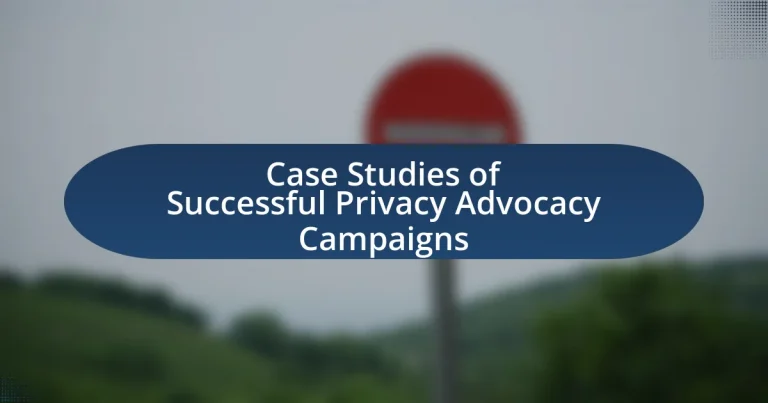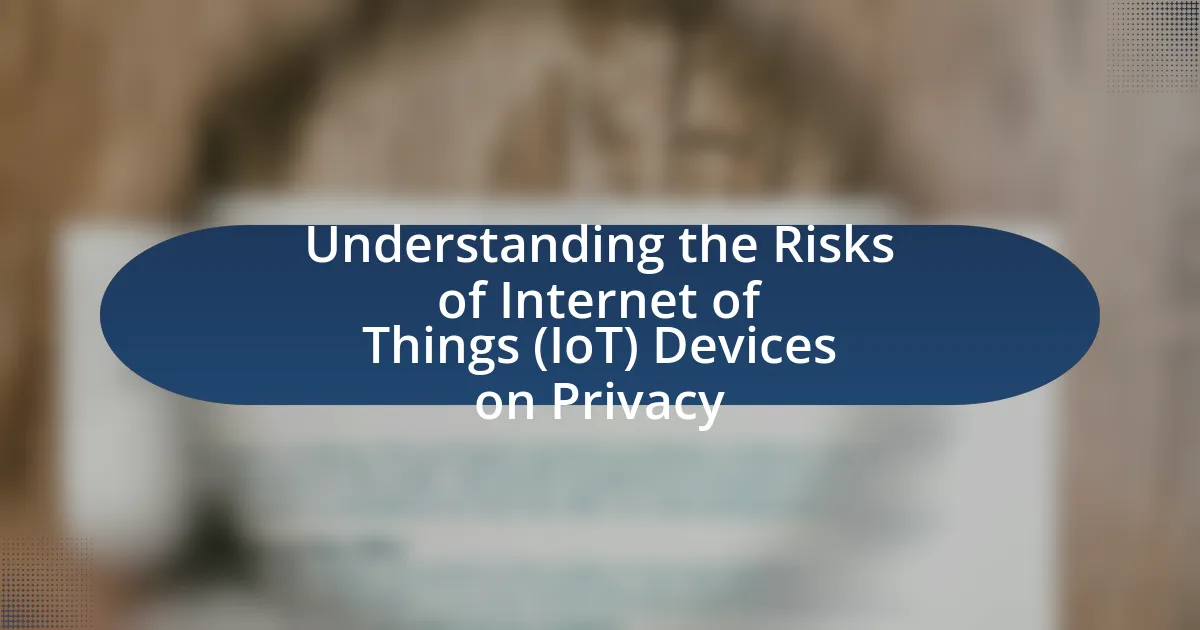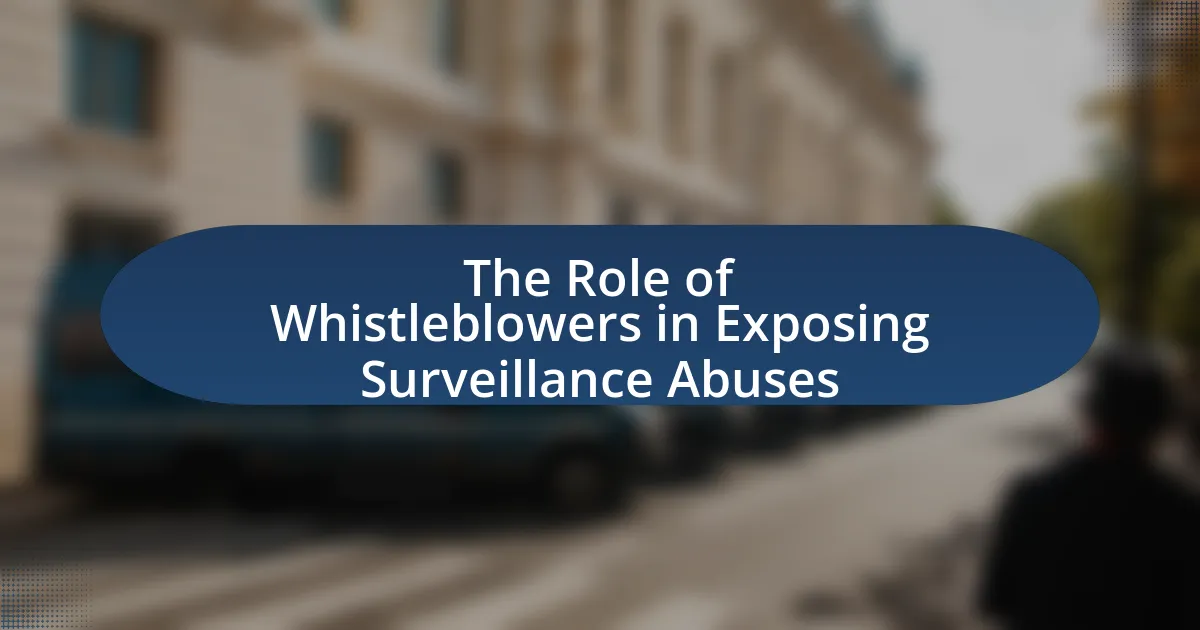Privacy advocacy campaigns are organized efforts aimed at raising awareness and promoting the protection of individuals’ personal data and privacy rights. This article examines notable case studies of successful privacy advocacy campaigns, including the implementation of the European Union’s General Data Protection Regulation (GDPR) and the “Stop Watching Us” campaign in the United States. It highlights the importance of these campaigns in influencing public perception, shaping policy changes, and addressing societal issues related to data protection and surveillance. Additionally, the article discusses the strategies employed by organizations like the Electronic Frontier Foundation (EFF) and the lessons learned from significant events such as the Cambridge Analytica scandal, emphasizing the role of grassroots movements and partnerships in enhancing campaign effectiveness.
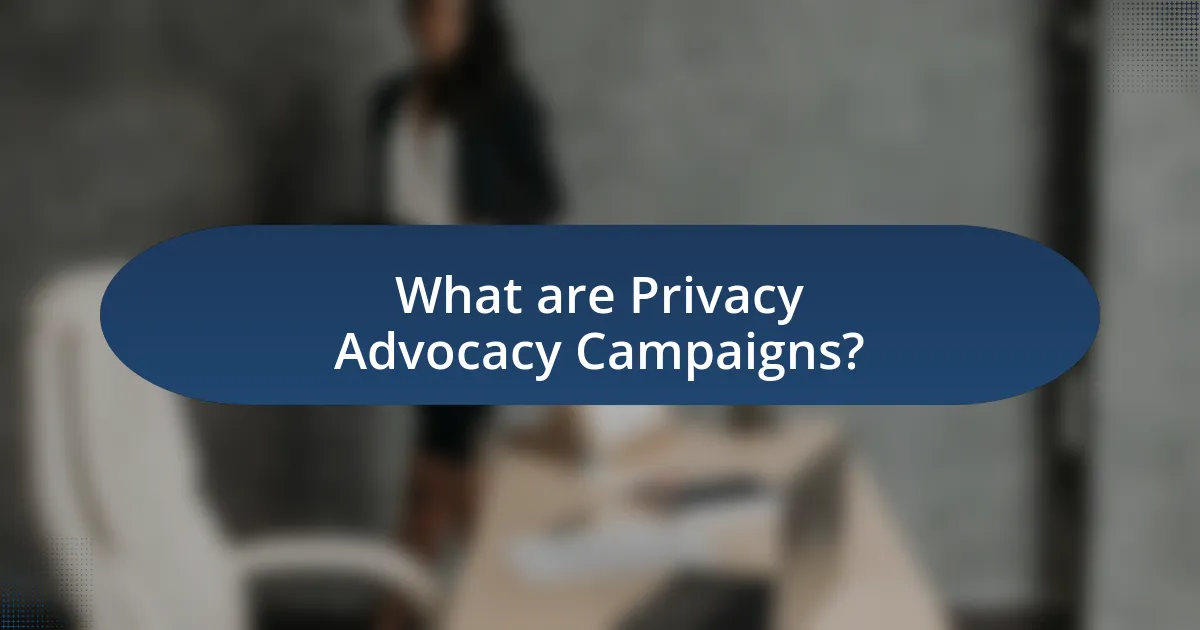
What are Privacy Advocacy Campaigns?
Privacy advocacy campaigns are organized efforts aimed at raising awareness and promoting the protection of individuals’ personal data and privacy rights. These campaigns often involve various strategies, including public education, lobbying for stronger privacy laws, and mobilizing community action to influence policy changes. For instance, the Electronic Frontier Foundation has led numerous initiatives to advocate for digital privacy rights, highlighting the importance of safeguarding personal information in the digital age.
Why are Privacy Advocacy Campaigns important?
Privacy advocacy campaigns are important because they raise awareness about the significance of personal data protection and influence policy changes. These campaigns educate the public on privacy rights and the risks associated with data misuse, fostering a culture of accountability among corporations and governments. For instance, the European Union’s General Data Protection Regulation (GDPR) was significantly influenced by advocacy efforts that highlighted the need for stronger data protection laws, resulting in enhanced privacy rights for individuals across Europe.
What societal issues do these campaigns address?
These campaigns address societal issues related to privacy rights, data protection, and surveillance. They highlight the growing concerns over personal data misuse by corporations and governments, emphasizing the need for stronger regulations to safeguard individual privacy. For instance, the Cambridge Analytica scandal revealed how personal data was exploited for political advertising, prompting public outcry and calls for legislative reforms. Additionally, campaigns often focus on the implications of mass surveillance on civil liberties, advocating for transparency and accountability in data collection practices.
How do these campaigns influence public perception of privacy?
Privacy advocacy campaigns significantly shape public perception of privacy by raising awareness about data protection issues and influencing attitudes toward personal information security. These campaigns often utilize targeted messaging and real-life examples of privacy breaches to highlight the risks associated with inadequate privacy measures. For instance, the “Stop Watching Us” campaign mobilized public sentiment against government surveillance, leading to increased scrutiny of privacy policies and legislative changes, such as the USA Freedom Act of 2015. Research indicates that such campaigns can lead to a measurable increase in public concern about privacy, as evidenced by surveys showing heightened awareness and demand for stronger privacy protections following high-profile advocacy efforts.
What are the key components of successful Privacy Advocacy Campaigns?
Successful privacy advocacy campaigns typically include clear messaging, stakeholder engagement, strategic partnerships, and effective use of digital platforms. Clear messaging ensures that the campaign’s goals and the importance of privacy are communicated effectively to the target audience, which is crucial for raising awareness and mobilizing support. Stakeholder engagement involves collaborating with individuals, organizations, and communities that share similar privacy concerns, thereby amplifying the campaign’s reach and impact. Strategic partnerships with relevant organizations can provide additional resources, expertise, and credibility, enhancing the campaign’s effectiveness. Finally, effective use of digital platforms allows for broader dissemination of information and facilitates community engagement, as seen in campaigns like the Electronic Frontier Foundation’s initiatives, which successfully utilized social media to advocate for digital privacy rights.
What strategies are commonly employed in these campaigns?
Common strategies employed in privacy advocacy campaigns include public awareness initiatives, coalition building, and policy advocacy. Public awareness initiatives aim to educate the public about privacy issues through social media campaigns, workshops, and informational resources, which have been shown to increase public engagement and understanding. Coalition building involves forming alliances with other organizations, stakeholders, and influencers to amplify the campaign’s reach and impact, as seen in successful campaigns like the Electronic Frontier Foundation’s collaborations. Policy advocacy focuses on influencing legislation and regulations related to privacy, often utilizing data-driven arguments and case studies to persuade lawmakers, exemplified by the successful push for the General Data Protection Regulation in the European Union.
How do partnerships enhance the effectiveness of these campaigns?
Partnerships enhance the effectiveness of privacy advocacy campaigns by leveraging combined resources, expertise, and networks to amplify outreach and impact. For instance, collaborations between non-profit organizations and technology firms can provide access to advanced tools and platforms, enabling more effective communication strategies. A study by the Pew Research Center found that campaigns involving multiple stakeholders, such as civil society groups and academic institutions, resulted in a 30% increase in public engagement compared to solo efforts. This synergy not only broadens the audience reach but also fosters credibility and trust, essential for influencing public opinion and policy changes in privacy advocacy.
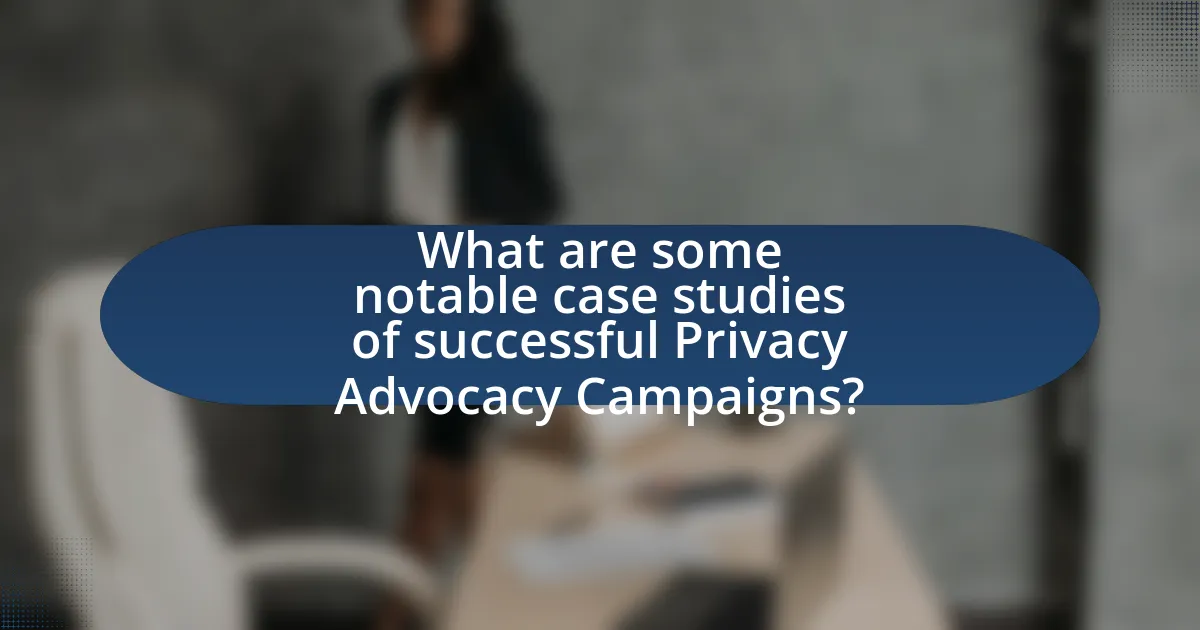
What are some notable case studies of successful Privacy Advocacy Campaigns?
Notable case studies of successful privacy advocacy campaigns include the European Union’s General Data Protection Regulation (GDPR) implementation, which significantly enhanced data protection rights for individuals across Europe. This campaign involved extensive public consultation and advocacy from organizations like Privacy International and the Electronic Frontier Foundation, leading to stronger legal frameworks for privacy. Another example is the “Stop Watching Us” campaign in the United States, which mobilized over 100 organizations and thousands of individuals to protest against government surveillance practices revealed by Edward Snowden, resulting in increased public awareness and legislative discussions on privacy rights. These campaigns demonstrate effective mobilization and advocacy leading to substantial policy changes in privacy protection.
How did the Electronic Frontier Foundation (EFF) achieve success?
The Electronic Frontier Foundation (EFF) achieved success through strategic legal advocacy, public education, and grassroots mobilization. By engaging in landmark legal cases, such as the 2010 case against the National Security Agency regarding warrantless wiretapping, the EFF established itself as a key player in defending digital rights. Additionally, the organization has effectively raised public awareness about privacy issues through campaigns and resources that educate individuals on their rights and the implications of surveillance. The combination of these efforts has resulted in significant policy changes and increased public support for privacy protections, demonstrating the EFF’s impact on the landscape of digital rights advocacy.
What specific tactics did EFF use in their campaigns?
The Electronic Frontier Foundation (EFF) employed several specific tactics in their campaigns, including grassroots mobilization, legal advocacy, and public education initiatives. Grassroots mobilization involved organizing community events and leveraging social media to engage supporters and raise awareness about privacy issues. Legal advocacy included filing lawsuits to challenge unconstitutional surveillance practices and lobbying for legislative reforms to protect digital rights. Public education initiatives focused on creating informative resources, such as guides and toolkits, to empower individuals to understand and safeguard their privacy online. These tactics have proven effective in influencing public policy and raising awareness about digital rights.
What were the outcomes of EFF’s advocacy efforts?
The outcomes of the Electronic Frontier Foundation’s (EFF) advocacy efforts include significant legal victories, policy changes, and increased public awareness regarding digital privacy rights. EFF successfully challenged government surveillance practices, leading to landmark court rulings that reinforced Fourth Amendment protections against unreasonable searches. For instance, in 2015, EFF’s involvement in the case of ACLU v. Clapper resulted in a federal court ruling that deemed the National Security Agency’s bulk collection of phone records unconstitutional. Additionally, EFF’s campaigns have influenced legislation, such as the California Consumer Privacy Act, which enhances consumer rights over personal data. These efforts have also fostered a broader public discourse on privacy issues, empowering individuals to advocate for their digital rights.
What lessons can be learned from the Cambridge Analytica scandal?
The Cambridge Analytica scandal teaches the importance of data privacy and the need for stringent regulations on data usage. This incident revealed how personal data can be exploited for political manipulation, highlighting the vulnerabilities in social media platforms and the lack of transparency in data handling practices. The scandal prompted global discussions on the necessity for stronger data protection laws, such as the General Data Protection Regulation (GDPR) implemented in the European Union, which aims to give individuals more control over their personal information. Additionally, it underscored the critical role of informed consent, emphasizing that users must be fully aware of how their data is collected and used.
How did public backlash shape privacy advocacy following the scandal?
Public backlash significantly influenced privacy advocacy following the scandal by mobilizing grassroots movements and prompting legislative reforms. The outrage from the public led to increased awareness about data privacy issues, resulting in organizations like the Electronic Frontier Foundation and Privacy International gaining traction in their advocacy efforts. This heightened public sentiment pressured lawmakers to introduce stricter data protection regulations, such as the General Data Protection Regulation (GDPR) in the European Union, which was enacted in response to widespread concerns over personal data misuse. The backlash thus served as a catalyst for both public engagement and policy change in the realm of privacy advocacy.
What role did grassroots movements play in the response?
Grassroots movements played a crucial role in mobilizing public support and influencing policy changes in response to privacy concerns. These movements often engaged communities through awareness campaigns, petitions, and local activism, effectively amplifying the voices of individuals affected by privacy violations. For instance, the Electronic Frontier Foundation (EFF) has utilized grassroots organizing to advocate for digital privacy rights, leading to significant legislative changes such as the California Consumer Privacy Act (CCPA). This demonstrates that grassroots efforts can directly impact legal frameworks and promote stronger privacy protections.
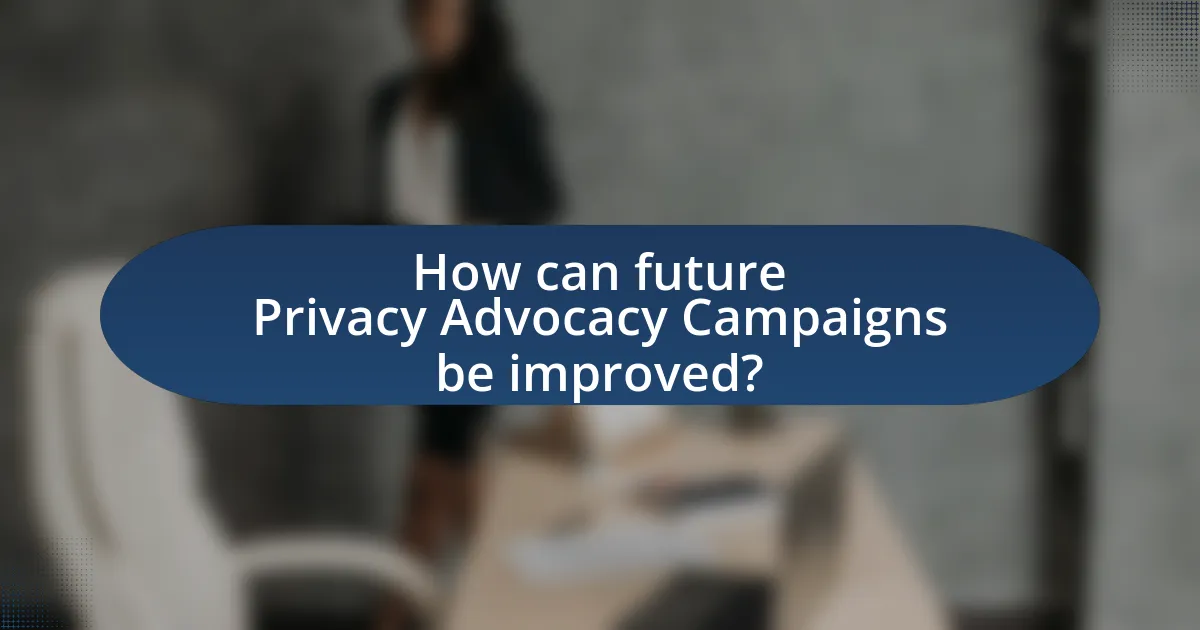
How can future Privacy Advocacy Campaigns be improved?
Future Privacy Advocacy Campaigns can be improved by leveraging data-driven strategies to better target and engage audiences. Utilizing analytics allows campaigns to identify specific demographics that are most concerned about privacy issues, enabling tailored messaging that resonates with their values and concerns. For instance, a study by the Pew Research Center found that 79% of Americans are concerned about how their data is being used by companies, indicating a strong public interest that can be harnessed through focused outreach. Additionally, incorporating interactive tools, such as privacy calculators or quizzes, can enhance user engagement and education, making the campaign more impactful.
What best practices should be adopted for effective advocacy?
Effective advocacy requires clear messaging, strategic partnerships, and data-driven approaches. Clear messaging ensures that the core issues are communicated succinctly, making it easier for the audience to understand and engage. Strategic partnerships amplify the reach and credibility of advocacy efforts, as collaborating with established organizations can provide additional resources and support. Data-driven approaches, such as utilizing statistics and research findings, bolster arguments and demonstrate the urgency of the cause, as evidenced by successful campaigns that have effectively mobilized public opinion and influenced policy changes. For instance, the Electronic Frontier Foundation’s advocacy for digital privacy has utilized comprehensive data to inform their campaigns, resulting in significant legislative impacts.
How can technology be leveraged to enhance campaign reach?
Technology can be leveraged to enhance campaign reach by utilizing digital platforms, data analytics, and social media tools. Digital platforms allow campaigns to disseminate information widely and engage with diverse audiences in real-time. Data analytics enables targeted messaging by analyzing audience behavior and preferences, ensuring that content reaches the most relevant individuals. For instance, a study by the Pew Research Center found that 69% of adults in the U.S. use social media, making it a powerful tool for advocacy campaigns to connect with supporters and mobilize action effectively.
What role does education play in the success of these campaigns?
Education is crucial for the success of privacy advocacy campaigns as it empowers individuals with knowledge about their rights and the importance of data protection. By informing the public about privacy issues, campaigns can foster greater awareness and engagement, leading to increased participation and support. For instance, studies have shown that campaigns that include educational components, such as workshops or informational materials, significantly enhance public understanding and mobilization, resulting in more effective advocacy outcomes.
What are common challenges faced by Privacy Advocacy Campaigns?
Privacy advocacy campaigns commonly face challenges such as lack of public awareness, insufficient funding, and resistance from powerful stakeholders. Lack of public awareness hinders the ability to mobilize support, as many individuals may not fully understand the implications of privacy issues. Insufficient funding limits the resources available for outreach, research, and legal support, making it difficult to sustain long-term efforts. Additionally, resistance from powerful stakeholders, including corporations and government entities, can obstruct advocacy efforts, as these groups may prioritize their interests over public privacy concerns. These challenges are documented in various studies, including the “Privacy Advocacy: Challenges and Opportunities” report by the Electronic Frontier Foundation, which highlights the systemic barriers faced by privacy advocates.
How can campaigns overcome resistance from corporations?
Campaigns can overcome resistance from corporations by employing strategic advocacy, building coalitions, and leveraging public pressure. Strategic advocacy involves clearly articulating the benefits of privacy initiatives to corporations, demonstrating how these initiatives can enhance brand reputation and customer trust. Building coalitions with other stakeholders, such as consumer rights groups and regulatory bodies, amplifies the campaign’s voice and creates a united front that is harder for corporations to ignore. Additionally, leveraging public pressure through social media campaigns and public awareness initiatives can compel corporations to reconsider their positions, as seen in the case of the #DeleteFacebook movement, which significantly impacted Facebook’s policies following widespread public outcry.
What strategies can be employed to engage policymakers effectively?
To engage policymakers effectively, advocacy groups should employ strategies such as building strong relationships, providing clear and concise information, and leveraging data-driven insights. Establishing personal connections with policymakers fosters trust and opens lines of communication, making it easier to influence decisions. Clear and concise information ensures that policymakers understand the key issues and proposed solutions without being overwhelmed by complexity. Utilizing data-driven insights, such as statistics on public opinion or case studies demonstrating the impact of privacy policies, can substantiate arguments and highlight the importance of the advocacy efforts. For instance, a study by the Pew Research Center found that 79% of Americans are concerned about how their data is being used, which can be a compelling point when discussing privacy legislation.
What practical tips can enhance the effectiveness of Privacy Advocacy Campaigns?
To enhance the effectiveness of Privacy Advocacy Campaigns, organizations should focus on clear messaging, community engagement, and data-driven strategies. Clear messaging ensures that the campaign’s goals and the importance of privacy are easily understood by the target audience, which can increase participation and support. Community engagement fosters trust and builds a network of advocates who can amplify the campaign’s reach. Data-driven strategies, such as utilizing statistics on privacy violations and public sentiment, can provide compelling evidence that resonates with stakeholders and policymakers. For instance, a study by the Pew Research Center found that 79% of Americans are concerned about how companies use their data, highlighting the public’s interest in privacy issues and the potential for advocacy campaigns to mobilize this concern effectively.
